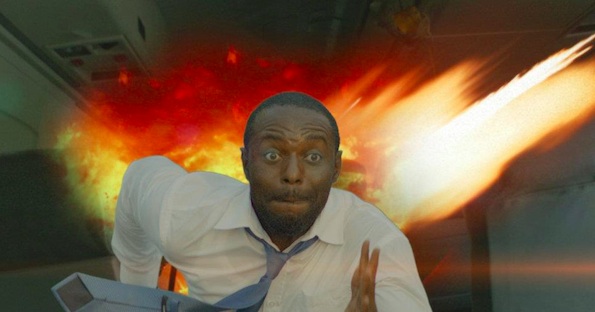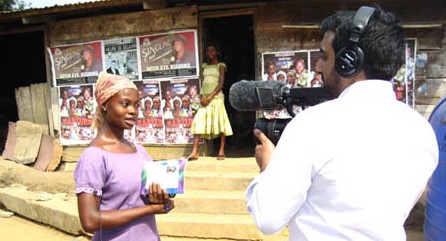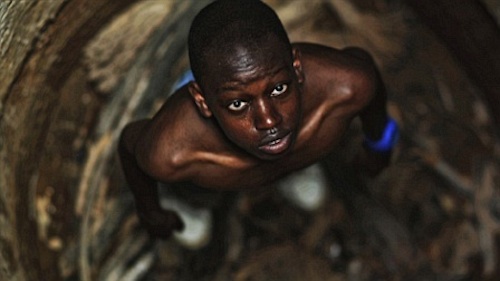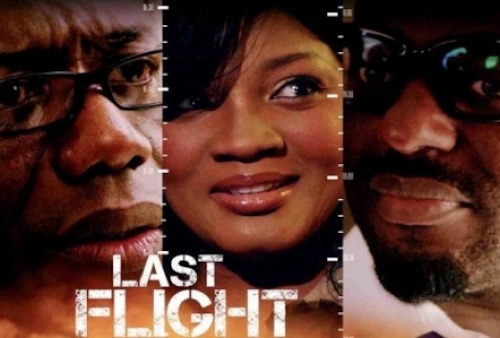Nollywood—Nigeria’s direct-to-video industry of scruffy, cheap films cranked out on hurried schedules and dumped onto the market at low prices—became the third largest producer of movies in the world in the 1990s. Obi Emelonye is one of the filmmakers challenging the Nollywood paradigm with the New Nigerian Cinema, a concerted effort to create domestic films strong enough to bring audiences back to the cinemas and good enough to be exported to other countries.
Emelonye, who practiced law in Great Britain for two decades, returned to Nigeria to follow his dream of filmmaking. His 2011 feature, The Mirror Boy, was a critical and commercial success and one of the few Nigerian films to be seen in film festivals outside of the country and his follow-up, the homegrown disaster film Last Flight to Abuja, was one of the top-grossing films in Nigeria in 2012. Unlike the fast, cheap, and out-of-control melodramas cranked out by Nollywood, Emelonye’s films took on more complex stories, complicated characters, and themes that cross cultures.
Last Flight to Abuja follows the model of Airport and other American and European disaster dramas of strangers tossed together in a crisis, but frames it within a distinctly Nigerian context. Though inspired by real events, it tosses a bit of everything into the ensemble: romance and marital conflict, comedy and crime, a murder, an affair, a little Nigerian star power (and it’s clear who the stars are simply by their confidence and command on the screen), and of course a crisis on an airplane. And along with the array of stories and experiences, the film presents something not seen in many Nigerian films: strong, confident, successful women in the professional world.
Emelonye took Last Flight to Abuja to film festivals all over the world, including the 2013 Seattle International Film Festival, where the film made its American debut, and along with discussing his film, Emelonye showed a shrewd and necessary understanding of the business and culture of Nollywood, the efforts to create a cinema culture in Nigeria and the challenges in taking on the entrenched Nollywood industry.
Keyframe: I understand that before you started directing films you were a lawyer in Britain. Is that right?
Obi Emelonye: It’s more complicated than that. I actually studied theater and drama and film in Nigeria before I went to the U.K. And when I arrived in the U.K. I discovered that it was a bit impractical to make a living as a theater artist starting at the lowest of the lowest ranks, so I had to make a pragmatic decision to find a different career that would allow me the time to still practice my craft and also that would have transferable skills. And I thought law was that. I learned my trade and honed my skills as a filmmaker while still practicing as a lawyer until a few years ago, in 2008, when I decided to concentrate on filmmaking. So in a way I’ve gone full circle with a different career. A friend of mine says ‘Everything we are goes into everything we do.’ The more varied my life experiences are, the more varied my skill set and my knowledge is, the better I will be at whatever I decide to do. In this instance, it makes me a slightly better, more complete, more eclectic filmmaker.
Keyframe: And Last Flight to Abuja is your third feature?
Emelonye: Yes. There have been a few that I am not so proud of right now. I’m not ashamed of them either, but in terms of plotting my history, I’d like to count from a certain point and from that point it would be the third film. And Last Flight to Abuja represents a huge stride for me personally as a filmmaker to even tackle the subject matter of aviation, the glamor and unfortunately the crashes. I would say that it has taken not just myself but a whole bunch of young filmmakers coming out Nigeria and Africa to give me the confidence to take on subject matter as difficult as this. Because the idea was that it was too costly to make and would not connect with the people. But the success of Last Flight to Abuja critically and commercially has told people that if you believe in it enough and do it with heart and passion, people will come out for it. That’s what has happened to us.
Keyframe: Last Flight to Abuja is based on a real-life incident from 2006. How close did you stick with the technical details and how much did you use as a jumping off point?
Emelonye: It was essentially a springboard. I resisted the temptation to be boxed into particular events. From my research of aviation and navigation problems, I took various elements, some of them technical, some of them human elements, and I looked at the circumstances of the many crashes in 2005 and 2006 in Nigeria and from those I gleaned what I considered to be elements of the story that would lend itself easy to cinema. With all the various elements I tried to weave this story in such a way that it’s believable, it has cinematic impact, and it works. Even though one of those planes that had difficulties in 2006 was actually the last flight that left from Lagos to Abuja, it wasn’t based on that flight. I used the elements as a springboard to tell my own story.
Keyframe: Let’s rewind and put your film in the context of the Nigerian film industry. The documentaries This is Nollywood and Nollywood Babylon and TV reports on 60 Minutes offer a very general overview of the culture. They show an industry geared to make films cheaply and quickly and sell them directly to audiences on DVD, where they have about a week to sell them before they became old, they became pirated, and then get displaced by new releases. But there is no discussion of films in theaters in Nigeria, of a culture of people going to the movies.
Emelonye: If you trace the history of Nollywood, you will see that it started as a purely entrepreneurial industry. There was no attempt to make it artistic, it was simply a man who had a warehouse full of VHS tapes who was a pirate of English films and Chinese films and decided—because people weren’t buying the English films and Chinese films any more—to put local content on the VHS tapes. He made a film called Living in Bondage (1992) and it flew off the shelves on VHS tapes and the industry was born, because his colleagues in the same line of business replicated the formula. So it was simply a means of selling VHS tapes and then subsequently DVDs. There was no attempt to make it artistic, there was no attention paid to factors of production, it was simply make it quick, grab it quick, and to an extent what was shown in those documentaries.
Over the last five or six years, there has emerged a new band of Nigerian filmmakers who are trying to tell essentially the same stories but tell them in a way that appeals to the rest of the world, and that has been encouraged by the re-emergence of cinemas in Nigeria. Cinemas in the eighties and nineties died gradually because of the security situation with all the military dictatorships and people being robbed and nobody would go to the cinemas. That was why the home entertainment-based system of distributing content worked, because people didn’t go out, so they found an alternative to the cinemas. In 2000 there was a resurgence of cinema multiplexes started by a gentleman who built a cinema complex called Silverbird Cinema, and social situation got better and people started going out the cinemas to watch, originally, western films. But with the rise in the quality from a few Nigerian filmmakers, there arose an opportunity to show some of those high-quality Nigerian films in the cinema.
The experiment started with a film called Through the Glass (2008) and was essentially consolidated by a film called Ije (2010), made by a young lady [Chineze Anyaene] who just came out of film school in L.A. And the success of those films proved that it was possible to make money in the cinemas for a Nigerian film. So that essentially tasked every filmmaker to say, ‘You know what? For you to get into the cinema you have to achieve a certain standard.’ When it was straight to video, there was very little value attached to the intellectual property and people would sell their film for peanuts once it had gone to DVD because they didn’t value it. As soon as some of the film started working in the cinemas, it encouraged a few filmmakers.
I live in London and I helped grow an audience for Nigerian films in the cinemas in London. I even tried to make films in Nigeria, but I just wasn’t streetwise enough to deal with the rookery and the unfaithfulness and the lies and the deceits of the industry, so I packed my things and went back to the U.K., and I said I was going to come back at a time when the circumstances were correct. And the circumstances came to what I call a perfect confluence in 2011, when I returned with a film called The Mirror Boy. The Mirror Boy became hugely successful and continued the success story of Nigerian films in Nigerian cinemas. So, on the back of that, a few other filmmakers tried to raise their game, tried to pay a bit more attention to the story, pay a bit more attention to the cinematography and the sound. You could say that the cinema forged a new industry that is now called New Nigerian Cinema, which is an offshoot of Nollywood and is essentially comprised of filmmakers might myself who attempt develop reasonable projects, tell slightly different stories, and tell them in such a way that they appeal to a broader, universal audience. They have the common connection of Nollywood but they have the artistic feel of Francophone French cinema, which is elitist. So we’re making good films that are not elitist for the first time in Africa, good films that are popular. And Last Flight to Abuja is another story in that direction.
Keyframe: Was it difficult to raise the budget for a bigger, more ambitious film in the Nigerian film culture today?
Emelonye: It is financial suicide. Honest. Because the structure that exists in the industry right now cannot sustain the kind of films that we are trying to make, which is why I become writer, director, producer, distributor, agent, promoter, lawyer, everything. Because if I just threw my film at the structures that are in place right now, I would be arrested by the people that I owe. Filmmakers like myself are pushing the international boundaries, trying to squeeze these films into places they’ve never been before: experimenting with VOD, experimenting with streaming online, experimenting with YouTube, experimenting with subtitling and dubbing in different languages just to broaden the markets, because that is the only way that it would make sense to spend the kind of money we are spending. But we also know that to be taken seriously as a film industry we need to have a cinema structure. We need to be a cinema industry. The straight-to-video industry gave Nigeria the dubious honor of becoming the second largest in the world just on quantity. We want quality and that’s happening, but it comes at a price. We have to be loss leaders, we have to be pioneers, we have to break new ground and push boundaries to try and make sure that we can pay some of the money we used to shoot the film.
So to answer your question directly, it is rather difficult to find the money to make this kind of film, but you do the maths: there are 160 million people in Nigeria. If you can get one percent of them to patronize the film on whatever format, you are smiling all the way to the bank. The challenge is to exploit the numbers that we have and the exploitation is difficult because there are only nine cinemas. Last Flight to Abuja only showed in nine cinemas in the whole country and from those nine cinemas it made nearly $260,000 over a period of six weeks. Now, if you extrapolate that and say we have fifty cinemas, you can now begin to image what would happen with an expanded industry. So the challenge is to try to maximize the revenue.
Keyframe: You also opened Last Flight to Abuja in the U.K. You had a premiere and it played theatrically.
Emelonye: Yes.
Keyframe: Did you find a Nigerian audience, or a broader audience for Nigerian cinema, in Britain?
Emelonye: I think that’s the wrong example for that. The Mirror Boy is slightly better. Last Flight to Abuja suffered from the coincidence of the crash [a major plane crash in Lagos in June 2012 that killed 153 passengers]. It affected me and it affected the film because I started feeling guilty. It happened five days before our premiere and I did not want to be seen to be benefiting from somebody else’s misery and I stopped marketing the film. In this business you have to scream to be noticed. So in a way the U.K. release did not work but I wasn’t disappointed with that because I always knew that it was a problem with the closeness of the crash and the uncanny similarity between the narrative of the film and the actual events of the crash, so it never worked in the U.K. But to use a more clinical example would be The Mirror Boy.
The Mirror Boy tells the story of a twelve-year-old boy who gets taken back home to Africa by his mom from London and he goes missing on his second day and meets this imaginary friend who takes him on a journey. So it’s a rite-of-passage, coming-of-age movie that every child and every parent who has a child in the diaspora can relate to, including Chinese and Indians. We promoted that powerfully on radio, on TV, online, and we had very response. It opened in only ten cinemas by Odeon Cinema, which had 250 cinemas across the U.K., but in our first week we were in the top five of those 250 cinemas because we literally sold out every seat. The campaign was good, the project was right, the timing was right, the circumstances came together. I walked into a screening and ten percent of the audience was from China and India. It just goes to reinforce the fact that if the project is right and it’s well promoted, once you conquer your immediate audience, your primary audience, which is Africans, Nigerians, then the opportunity for the secondary audience is huge. But somebody has to own that project first. You don’t make a film and say it’s a global film. You have to be local to be global.








